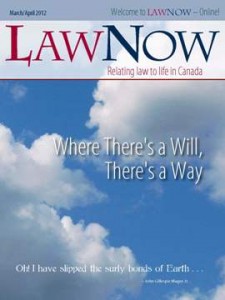Glen Race murdered two Halifax men in 2007. He pled guilty to both charges and then made an application to be found not criminally responsible (NCR).
Mr. Justice Kevin Coady of the Supreme Court of Nova Scotia reviewed the law and the legal requirements for a convicted person to be found not criminally responsible. He concluded that Mr. Race suffered from a mental disorder that made him incapable of knowing that his actions were wrong. In his case, three psychiatrists, both for the Crown and the defence agreed that Mr. Race qualified for a finding of NCR. An agreed statement of facts from the three doctors stated that he suffered from schizophrenia and that he believed he was a vampire slayer and a godlike entity ordered by angels to cleanse the world of demons and sin.
Justice Coady wrote: “After considering all of the evidence, I am satisfied that Mr. Race qualifies for an NCR defence…He suffered from a mental disorder on both occasions, that being schizophrenia. I am also satisfied that Mr. Race, as a result of his mental disorder, did not realize that these actions were morally wrong. I am satisfied that he really believed they were necessary to achieve his psychotic mission.”
Justice Coady made two other interesting observations. First, he reached out to the families of the murdered men and said that in the context of a NCR finding: “It is important to realize that Mr. Race, his family, and friends are victims as well. They are victims of a cruel and unforgiving illness of schizophrenia. Given that there is no cure and that Mr. Race’s case is so severe, their victimization will continue for the rest of their lives. This in no way minimizes the pain and loss the Knott and Brewster families have, and will continue to, experience. These homicides are different than most killings in that the perpetrator and the victims are victims.”
Then, Justice Coady added: “It is important to note that an NCR finding is not an acquittal. Mr. Race will be held responsible for killing Paul Knott and Trevor Brewster. There will be consequences for those actions and those consequences will continue for the rest of his life.”
R. v. Race, 2014 NSSC 6 (CanLII)
Article originally published in LawNow magazine, March/April 2014 issue. For more articles on contemporary issues with a legal perspective, see the LawNow website at https://www.lawnow.org/.
Bench Press: “Ski Buddy” Liability
Mark Kennedy of Colorado died on a heli-skiing expedition when he fell into a tree well.
His widow claimed that he had been paired with a “ski-buddy” who was contractually obliged to stay close to him, keep him in sight and assist or alert guides and other skiers if he saw that his buddy needed help. She also alleged that the buddy, Adrian Coe, owed a duty of care in tort law to Mark Kennedy. She sued Mr. Coe for loss of future earnings over her husband’s death.
Madame Justice Fisher of the British Columbia Supreme Court dismissed the action. She found that just because the two men had been paired to ski together there was no basis to find that there was a contract between them. Similarly, she ruled that Mr. Coe did not owe a duty of care to Mr. Kennedy, and that even if there were, Mr. Coe would have met the standard.
She summarized: “It is indeed very sad that Mr. Kennedy met a tragic and untimely death, but he did so while participating in a high-risk sport and responsibility for his death cannot be placed on Mr. Coe.
Kennedy v. Coe, 2014 BCSC 120 (CanLII)
Article originally published in LawNow magazine, March/April 2014 issue. For more articles on contemporary issues with a legal perspective, see the LawNow website at https://www.lawnow.org/.
Drunk Driving and the Constitution
This blog post is an excerpt from Bench Press in the March/April 2012 issue of LawNow magazine. To view the magazine and subscribe please go to www.lawnow.org.

Justice Jon Sigurdson of the British Columbia Supreme Court has ruled that parts of B.C.’s new drunk driving law are unconstitutional.
Changes to the province’s Motor Vehicle Act introduced automatic roadside suspensions for drivers with a blood-alcohol content of .05 or higher. Vehicles can be impounded for up to 30 days and penalties of up to $4000 can be assessed. Justice Sigurdson ruled that these changes are a justifiable infringement on Charter rights. However, he took issue with drivers who “fail” a breathalyzer test by showing a blood-alcohol level of .08 or higher. For these drivers, he wrote that the law “authorizes a search by a screening device on the basis of reasonable suspicion and impose lengthy prohibitions and significant costs and penalties on motorists, without providing motorists with any meaningful basis to challenge the validity of the search results.” He ruled that this violates the Charter protection against unreasonable search and seizure, and he concluded that in these instances, the province needs to provide an appeal process.
This decision has significance beyond the B.C. border. Alberta has enacted very similar legislation and intends to proceed with its implementation despite the B.C. court ruling.
Sivia v. British Columbia (Superintendent of Motor Vehicles) 2011 BCSC 1639 (CanLII)